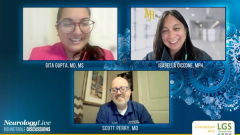
Identifying Gaps in Lennox-Gastaut Syndrome Care Across the Lifespan

Experts highlighted the need for clearer treatment sequencing and improved transition of care for patients with LGS from childhood to adulthood. [WATCH TIME: 3 minutes]
WATCH TIME: 3 minutes | Captions are auto-generated and may contain errors.
Episodes in this series

Lennox-Gastaut syndrome (LGS) is a rare epilepsy syndrome that typically begins in childhood and is associated with frequent seizures, cognitive impairment, and long-term disability. The LGS Foundation hosted its 3rd biennial
In collaboration with
In this first episode, clinicians discussed major gaps in current LGS care, including uncertainty around optimal treatment sequencing for seizures and the challenges in transitioning care from pediatric to adult settings. Although multiple approved therapies exist, experts noted that there is no consensus on first-, second-, or third-line choices because of a lack of direct comparative studies. Additionally, the duo highlighted that care needs and resources change significantly as children with LGS age, calling for more structured, seamless integration between pediatric and adult care providers to ensure consistent support for both patients and families.
Transcript edited for clarity.
Isabella Ciccone, MPH: From a clinical standpoint, what do you see as the most pressing gaps in current LGS care that were discussed at the meeting?
Scott Perry, MD: There are a lot of gaps, and I don't think I can hit on all the gaps we discussed during our couple of days. One of the biggest concerns is, really, what is the right treatment from a seizure standpoint? Seizures are 1 of the primary issues we deal with in LGS, and we're lucky that we have approved drugs for the condition, but it's unclear which one you should go with first. What's second line? What's third line? You can look at multiple consensus statements and algorithms, and you'll find that they're all a little bit different. Many of them have lines with multiple drugs across them, like none is better than the other, and it's just because we don't have any direct comparison or really know. That was one of the things that people were really interested in trying to drill down and understand: For seizure type, for patient characteristic, what is the best medicine for each of the situations? And we had some action items before we left about how we might address that.
Gita Gupta, MD, MS: Another big theme that stood out to me was how do we care for children with LGS across the lifespan? When you have younger parents who are taking care of younger children, there's a different type of investment of time and care and energy that you can provide to the younger child. But what happens when the child grows up to be an adult and the caregiver is an older adult? And there's a whole different set of resources available to adult patients compared to pediatric patients. This is the case for any child, let alone a child with complex and chronic medical problems. I thought it was amazing that this was a highlight, and that people who have more experience from other fields, like congenital heart disease and cystic fibrosis, were able to share their perspectives, because they've done an amazing job. As you know, I'm a pulmonologist, and we have very seamless integration—or we try to—with our adult pulmonology colleagues for children with cystic fibrosis, for example. We're trying to do a better job for children who are ventilator dependent, and I think LGS is one such condition, too, where there's more work to be done to transition the care seamlessly, both for the child and for the family. So it's nice to hear about that.
Newsletter
Keep your finger on the pulse of neurology—subscribe to NeurologyLive for expert interviews, new data, and breakthrough treatment updates.











